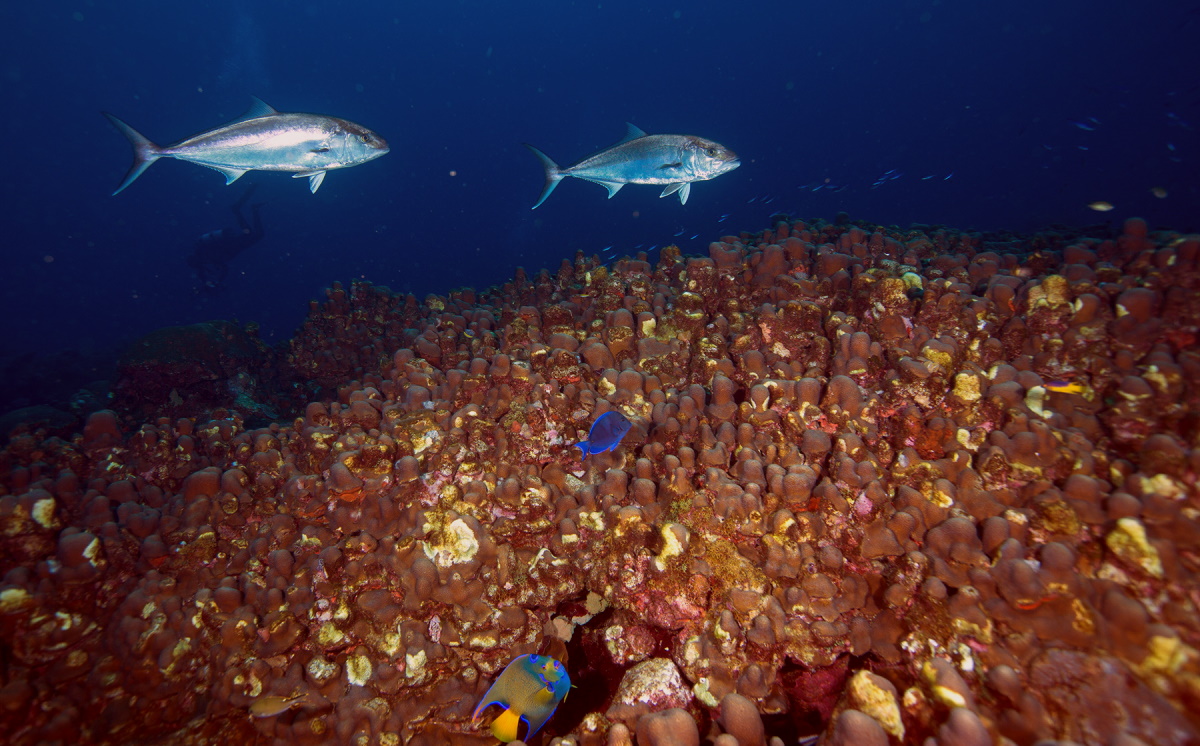
Amberjack swimming over a field of threatened lobed star coral (Orbicella annularis) in the Flower Garden Banks National Marine Sanctuary.
By Melissa Gaskill
Texas Climate News
As previously reported in Texas Climate News, scientists documented a global coral-reef bleaching event in 1997 and 1998, followed by a second in 2010. A third event lasted from June 2014 to May 2017, the longest, most widespread and most damaging on record, according to the National Oceanic and Atmospheric Administration’s Coral Reef Watch.
Bleaching, a condition when multi-hued coral organisms stressed by elevated water temperatures appear white, can eventually kill the organisms. But a new study in the scientific journal Current Biology reports that severe marine heat waves due to climate change simply kill corals outright. Within days, algae and bacteria cover and begin dissolving the exposed coral skeletons, flattening them and reducing their density and hardness.
The blue-green bacteria that initiate this process normally live in coral skeletons, says Mark Eakin, Coral Reef Watch coordinator and one of the authors. They feed on nutrients seeping down from the coral and use light not absorbed by photosynthetic algae inside the coral tissue.
“When coral bleaches or dies from heat waves, these bacteria start to grow very rapidly,” Eakin told Texas Climate News. “They now get all the light plus are fertilized by the dead coral tissue. All around the world, we saw this very consistently occurring right after the corals die.”
The study predicts more frequent mortality events as the intensity of marine heat waves increases.
Off the coast of Texas, temperatures on reefs at the Flower Garden Banks National Marine Sanctuary increased sufficiently to elicit a bleaching warning from NOAA on Aug. 13. The sanctuary, Eakin warns, is not immune to the coral mortality and erosion documented in the study.
So far, the Flower Gardens have not had mass coral death associated with bleaching or as many bleaching events as other places, Adrienne M.S. Correa, an assistant professor at Rice University, told TCN, but without mitigation of climate change, that could change.
“Although we haven’t seen the particular phenomenon described in the paper, we have seen microbial communities get out of hand and contribute to coral death,” she said. “These sorts of microbial issues already have an effect there.”
Severe marine heat waves could cause collapse of coral ecosystems, in turn threatening the livelihoods of half a billion people worldwide who directly rely on the goods and services they supply.
+++++
Melissa Gaskill is a contributing editor of Texas Climate News
